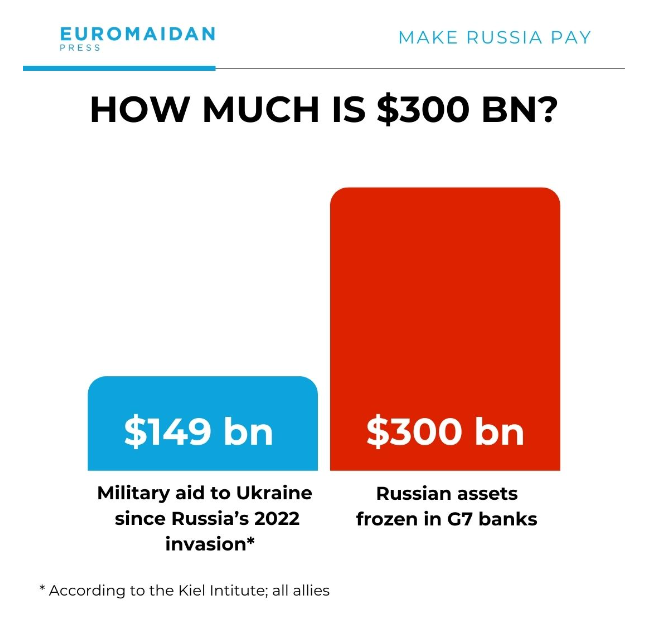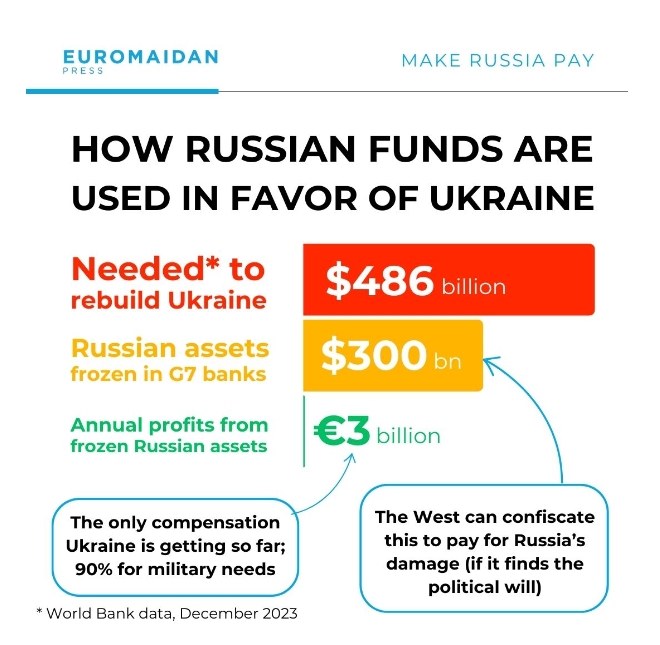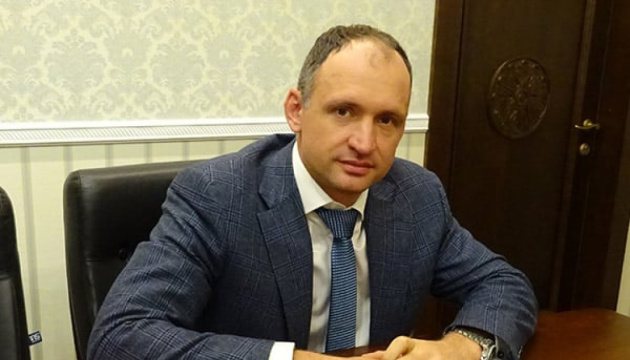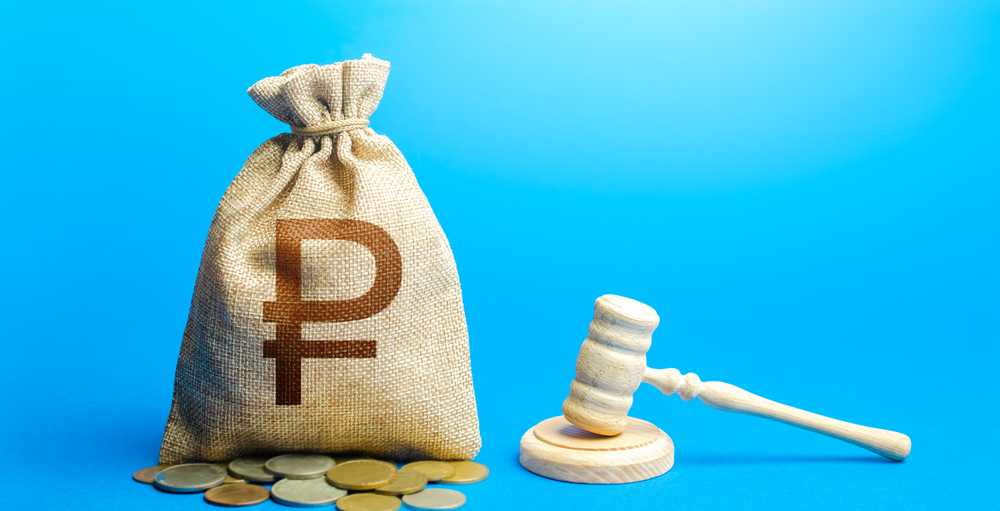The transfer of $300 billion of Russia's frozen sovereign assets to Ukraine could be decided at the G7 summit on 13-14 June in Apulia, Italy. The confiscation of these funds could be a lifeline for both Ukraine and the West.
For Ukraine, it would provide crucial support to withstand Russia's assault and potentially win the war. For the West, it offers a solution to funding Ukraine's defense, as they cannot leave Ukraine alone in this fight.
The math is straightforward: according to the Kiel Institute for the World Economy, widely regarded as the best tracker of international aid for Ukraine, the total military assistance over the past two years is just over $100 billion from all international partners, including the US.

The $300 billion from Russia's assets would be a significant boost.
"If these funds are available, and at least a portion is directed towards military assistance for Ukraine in contracting critical equipment, we hope the situation on the battlefield will change drastically," Daria Kaleniuk, the executive director of Kyiv's Anti-Corruption Action Center, told Euromaidan Press.
While moral, legal, and economic justifications exist for confiscating the aggressor's money to aid the victim, Western countries still have doubts, including concerns over corruption in Ukraine.
In an interview with Euromaidan Press, the renowned anti-corruption activist Kaleniuk, who advocates for Ukraine's victory internationally, discussed options for confiscating Russian money being considered in the West and how Ukraine is preparing for potential receipts.
$3 billion annually for Ukraine
The confiscation of Russia's frozen $300 billion sovereign assets is being discussed by G7 countries. However, initial steps have been taken:
- A decision to use proceeds from seized Russian assets, amounting to around $3 billion annually for Ukraine.
- The European Commission has decided to allocate 90% of these proceeds for military aid to Ukraine.

The key question now is how these funds will be utilized. Daria Kaleniuk, the executive director of Kyiv's Anti-Corruption Action Center, outlines several options, each with its own pros and cons:
- Channeling the money through the European Peace Facility, which reimburses EU states for weapons supplied to Ukraine.
- A European Commission body directly procuring weapons for Ukraine using the funds.
- The funds going directly to Ukraine's Defense Procurement Agency to purchase Ukrainian and foreign-made weapons.
Another consideration is whether the funds can be used to procure only foreign weapons or also Ukrainian-produced ones.
"The ideal scenario for Ukraine would be for these funds to come directly to our reformed Defense Procurement Agency, allowing us to purchase weapons from both Ukrainian and foreign manufacturers," Kaleniuk states.
$50 billion loan for Ukraine
Another option being discussed is a $50 billion loan for Ukraine's needs, with proceeds from frozen Russian assets being used to repay it.
"It's crucial these funds go directly towards procuring weapons for Ukraine. Economic needs can be covered by other financing, but the biggest challenge is securing funds for arms," says Kaleniuk.
The money allocated by the US for Ukraine is finite, and the next such package is unlikely to be approved quickly. Therefore, Kyiv needs an alternative source of financing for long-term arms contracts.
Key questions remain on utilizing these funds effectively - whether through EU bodies procuring weapons for Ukraine or a special dedicated fund.
"Some countries like the UK and Denmark have created their own funds for purchasing weapons for Ukraine, while NATO procurements face lengthy procedures," Kaleniuk says.
Crucially, Ukraine advocates for the ability to purchase domestically-produced weapons cost-effectively with these funds.
"We have many innovations, including drones, that are cheaper than Western arms and can rapidly adapt to battlefield needs," Kaleniuk notes.
$300 billion jackpot for Ukraine
If the West confiscates Russia's frozen $300 billion for Ukraine's benefit, it would become a game-changing resource for achieving victory, as Europe and the US lack other sources to continue financing the war effort.
"Ukraine would win. We'd no longer be dependent on the political situations in the US or EU. A dedicated victory fund allowing long-term weapons procurement would be created," explains Kaleniuk.

The confiscated Russian assets would enable Ukraine to purchase vital foreign arms while bolstering domestic production capabilities. Crucially, funds could also rebuild critical infrastructure decimated by Russia, especially the 70% of power generation lost.
Importantly, the confiscated funds would allow Ukraine to contract new, modern weapons rather than relying on outdated equipment from partners' reserves. Much of the current military aid involves aging stock that gets written off after transfer, while donor nations procure new arms for themselves. While grateful for all support, the old equipment often arrives with significant operational drawbacks, like the inoperable Leopard tanks.
What about Ukrainian corruption?
To allay concerns over potential misuse, Ukraine and Western partners have implemented robust safeguards. All direct Western budget support now goes through the World Bank, eliminating avenues for corruption in disbursement.
"The World Bank reimburses the Ukrainian treasury's accounts directly, primarily for public sector salaries," says Kaleniuk.
Crucially, Ukraine is overhauling its Defense Procurement Agency responsible for arms acquisitions. An independent supervisory board is being formed through an open selection process to ensure oversight.
"It's essential that the list of all candidates is public to maximize trust in this competition. Then Ukraine can confidently claim it has a NATO-standard reformed Defense Procurement Agency guaranteeing no weapons corruption," states Kaleniuk.
However, comprehensive law enforcement reforms remain imperative to build trust in Ukrainian authorities. Tainted individuals like Oleh Tatarov, the deputy presidential office head accused of corruption and cracking down on Euromaidan protesters, must be removed, says Kaleniuk.

Tatarov currently coordinates law enforcement reforms, wielding influence over most agencies except specialized anti-corruption bodies.
"Our anti-corruption institutions function reasonably, but it's insufficient with people like Tatarov overseeing reforms. Someone with his background cannot head this process," Kaleniuk says.
*****
As the G7 deliberates, Ukraine advocates for a transparent mechanism to utilize seized Russian assets for strengthening its defense capabilities. Confiscating these assets unlocks a sustainable war chest, reducing Ukraine's dependence on foreign aid while facilitating investment in domestic defense production, providing a path to military superiority over Russia.
The West's willingness to repurpose Russian assets could be the turning point, equipping Ukraine with reliable funding for an unconditional victory that safeguards its sovereignty.
Ukraine is addressing concerns over potential misuse of funds by channeling Western support through the World Bank and reforming its Defense Procurement Agency. However, comprehensive law enforcement reforms and the removal of tainted individuals from key positions remain crucial to building trust and ensuring effective utilization of confiscated assets.
Read more:
- Confiscating Russian assets to secure compensation for Ukraine
- Bloomberg: US proposes $50 billion bond to support Ukraine with frozen Russian assets
- Austrian chancellor opposes using profits from frozen Russian assets to finance weapons for Ukraine
- EU aims to send €3bn annually for Ukraine from frozen Russian assets profit
- Why the West does not confiscate Russian frozen assets in Ukraine war

